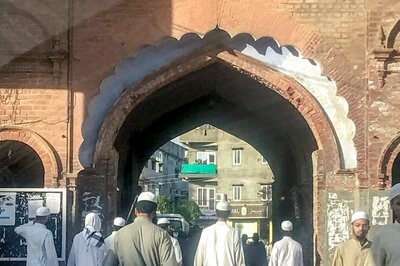
views
“Bengal toh ek bahana hai, pura desh nishana hai”. This slogan has gained currency following the recent stand-off between the Centre and West Bengal Chief Minister Mamata Banerjee who was vociferously supported by opposition parties across the country.
Mamata Banerjee’s three-day dharna was triggered by the sudden arrival of 40 CBI officers at Kolkata police commissioner Rajeev Kumar’s residence to interrogate him in connection with the Saradha and Rose Valley Ponzi schemes.
A furious Banerjee accused the Modi government of indulging in a political witch-hunt ahead of Lok Sabha elections, a charge that was picked up by other opposition leaders who stood in solidarity with the Trinamool Congress chief.
The line-up of opposition leaders who either called or reached the dharna site in Kolkata to support Banerjee included Congress president Rahul Gandhi, BSP chief Mayawati, Andhra Pradesh CM Chandrababu Naidu, Rashtriya Janata Dal leader Tejashwi Yadav, Samajwadi Party president Akhilesh Yadav and DMK’s Kanimozhi.
No sooner had the opposition leaders spoken in support of Banerjee that the BJP came down heavily on them, promptly dubbing the grouping as an “alliance of the corrupt”. Minister without portfolio Arun Jaitley, who is undergoing treatment for an undisclosed ailment in New York, was quick in penning a blog in which he stated that all those who were backing Banerjee were a ‘Kleptocrat’s Club’ and accused the West Bengal CM of “assaulting federalism”. This argument has since been trotted out by BJP leaders as a party mantra.
Mamata Banerjee may have been the immediate target in this entire episode but the manner in which events panned out shows a clear attempt by the BJP to build a narrative that the opposition leaders, who have come out to support the Bengal CM, are a corrupt and discredited lot and are essentially banding together to save themselves. The idea is to use this incident to send out a message across the country that the BJP-led central government is a “clean and honest” dispensation and to project Prime Minister Narendra Modi as a crusader who is fighting a lone and valiant battle to weed out the corrupt and stamp out corruption.
All this in sharp contrast to the rag-tag conglomeration of leaders on the other side of the political divide who are embroiled in scams. The BJP may have handed a political advantage to the feisty Trinamool Congress leader in West Bengal by upping ante on the Saradha case, but the party is depending on this drama to strengthen its position outside the state by making corruption the centrepiece of its electoral strategy.
It is no coincidence then that the CBI and other investigative agencies have suddenly become proactive in investigating old cases before elections and after opposition parties started building alliances in different states. Consequently, television viewers witnessed the spectacle of 40 CBI officers descending at the residence of the police commissioner in Kolkata to question him on a Sunday without prior warning. The timing of the visit and the manner in which the CBI in conducted itself in this instance was tailor-made for a confrontation, which is exactly what happened.
This was followed by non-stop coverage of Rahul Gandhi’s brother-in-law Robert Vadra’s interrogation at the office of the Enforcement Directorate in New Delhi. The protracted inquiry into Vadra’s dubious business deals picked up speed after Priyanka Gandhi Vadra was appointed Congress general secretary close to the elections. It will be no surprise if the pending National Herald case against Rahul Gandhi and former Congress president Sonia Gandhi is also fast-tracked in the coming days.
Some days ago, the Enforcement Directorate had searched several places in Uttar Pradesh in connection with a Rs 1,400 crore memorial scam which took place when Mayawati was chief minister. This was preceded by a CBI raid on ministers and officers in former chief minister Akhilesh Yadav’s government in an old case of illegal mining. Incidentally, Mayawati was in power from 2007 to 2012, which was followed by the Samajwadi Party leader’s term.
All these efforts will be supplemented by “revelations” by middleman Christian Michel in the AgustaWestland case and the possible extradition of other such agents. The icing on the cake will be if the Modi government succeeds in bringing back liquor baron Vijay Mallya before the Lok Sabha polls.
As the Kolkata incident has shown, the Modi government’s intention to resurrect the corruption issue in the run-up to the Lok Sabha elections will also see greater unity among the opposition parties in the coming days. But instead of working to his disadvantage, this show of solidarity can actually prove to be a boon for Modi.
In such a situation, Modi will not be required to battle his rivals separately on different issues in different states. Instead, he will be able to fight them collectively on a single point agenda, which not only presents him a perfect opportunity to burnish his credentials as an honest and upright leader but also shows the other side as a tainted bunch.
(Author is a senior journalist. Views are personal)


















Comments
0 comment